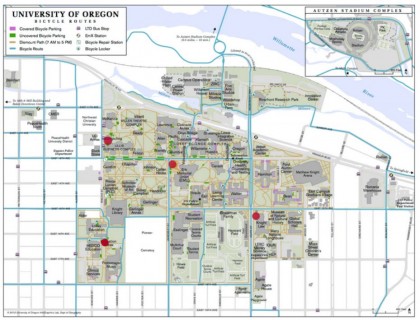With its bike parking spaces crammed and its long-term bike loan program booked solid, the University of Oregon is preparing to add a four-station bicycle sharing system on its Eugene campus.
The cities of Eugene and Bend, meanwhile, are considering municipal systems of their own.
“We really can’t meet the demand for the bikes that we have on campus,” said Briana Orr, a university staffer who manages UO’s $30-per-term bike library, which has 100 bikes in its fleet. “We’re trying to find a way to serve more students and still provide a really high-quality bike, and keep the costs low.”
It’s the latest step in the continuing spread of bicycle sharing, now available on one scale or another in 40 U.S. urban areas. Portland has secured funding commitments for its proposed 75-station system but hasn’t yet finalized contracts with its private sponsor or sponsors. Last week, the Portland Mercury reported that a spring 2014 launch seems increasingly unlikely for Portland’s system.
B-Cycle, the Wisconsin-based bikesharing vendor that provides equipment to many of the nation’s smaller bike sharing systems, has received the contract and is currently negotiating with the college, which will use $199,000 in student activity fees to install the four-station, 40-bike system.
As with other bike sharing systems, members of the public and visitors to campus will be able to use the bikes for a fee, in addition to students, faculty and staff. Orr said the university hasn’t determined yet how much the system’s users will pay for the service.
In Madison, Wisc., a B-Cycle bikesharing system charges students $20 per year for membership. Trips of 30 minutes or less are free to members, with upward-sliding fees for longer trips.
“We really see this as an extension of transit. It’s exactly what they do. They’ve got all the marketing expertise, they know where the destinations are going to be.”
— Eugene bike planner Reed Dunbar on Lane Transit District’s interest in public bike sharing
The university system was conceived as part of a larger plan to bring a citywide bikesharing system to Eugene, linking the campus with perhaps 30 or so stations around the city’s downtown commercial and residential areas.
Eugene planner Reed Dunbar said in an interview that though the city missed a federal grant last year that would have paid for such a system’s launch, the city has hired Toole Design Group to complete a feasibility study for a Eugene system, to be wrapped up in early spring.
“We’re really trying to figure out what this thing is going to look like: where our activated blocks are, where the stations would be more successful,” Dunbar said. “We know that the university is a major destination.”
Lane Transit District, Eugene’s transit system, is co-funding the feasibility study. Because the bus lines between downtown Eugene and the campus often run at capacity, a bike sharing system is seen as a possible low-cost way to improve transportation between those areas.
“We really see this as an extension of transit,” Dunbar said, saying that LTD will be a valuable partner in planning the system. “It’s exactly what they do. They’ve got all the marketing expertise, they know where the destinations are going to be. It ties in nicely with the new station developments.”
Portland-based Alta Bicycle Share, a B-Cycle competitor which operates many of the country’s larger bike sharing systems (but a few smaller ones, including a 9-station system at Washington State University in Pullman) didn’t make a pitch for the UO system.
Meanwhile, in Bend, a top parks planner signed up for a webinar last week on how to fund bike sharing systems. Last year, Bend nonprofit Commute Options launched a bike share demonstration area for its office building. Executive Director Jeff Monson said he hopes the city can find funding for a 6-10 station system.
“The city council, MPO, Parks and Rec, downtown association, they’re all interested,” he said. “I like bike share a lot. I think it’s the wave of the future.”
Orr said part of the appeal of a bike sharing system for the University of Oregon is that, with 21 percent of off-campus students arriving by bicycle, the university’s 6,000-plus bike parking spaces are full up.
“I suspect that if we can provide folks with bikes through bikeshare on campus, it’s going to alleviate some of our bike parking challenges,” she said. “Trying to figure out ways to serve more people with less space — I think that’s every university’s challenge.”

